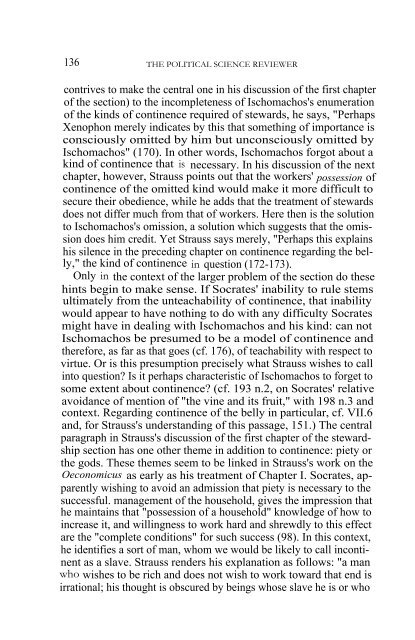Strauss on Xenophon's Socrates Xenophon's Socratic Discourse: An ...
Strauss on Xenophon's Socrates Xenophon's Socratic Discourse: An ...
Strauss on Xenophon's Socrates Xenophon's Socratic Discourse: An ...
Create successful ePaper yourself
Turn your PDF publications into a flip-book with our unique Google optimized e-Paper software.
136 THE POLITICAL SCIENCE REVIEWER<br />
c<strong>on</strong>trives to make the central <strong>on</strong>e in his discussi<strong>on</strong> of the first chapter<br />
of the secti<strong>on</strong>) to the incompleteness of Ischomachos's enumerati<strong>on</strong><br />
of the kinds of c<strong>on</strong>tinence required of stewards, he says, "Perhaps<br />
Xenoph<strong>on</strong> merely indicates by this that something of importance is<br />
c<strong>on</strong>sciously omitted by him but unc<strong>on</strong>sciously omitted by<br />
Ischomachos" (170). In other words, Ischomachos forgot about a<br />
kind of c<strong>on</strong>tinence that is necessary. In his discussi<strong>on</strong> of the next<br />
chapter, however, <str<strong>on</strong>g>Strauss</str<strong>on</strong>g> points out that the workers' possessi<strong>on</strong> of<br />
c<strong>on</strong>tinence of the omitted kind would make it more difficult to<br />
secure their obedience, while he adds that the treatment of stewards<br />
does not differ much from that of workers. Here then is the soluti<strong>on</strong><br />
to Ischomachos's omissi<strong>on</strong>, a soluti<strong>on</strong> which suggests that the omissi<strong>on</strong><br />
does him credit. Yet <str<strong>on</strong>g>Strauss</str<strong>on</strong>g> says merely, "Perhaps this explains<br />
his silence in the preceding chapter <strong>on</strong> c<strong>on</strong>tinence regarding the belly,"<br />
the kind of c<strong>on</strong>tinence in questi<strong>on</strong> (172-173).<br />
Only in the c<strong>on</strong>text of the larger problem of the secti<strong>on</strong> do these<br />
hints begin to make sense. If <strong>Socrates</strong>' inability to rule stems<br />
ultimately from the unteachability of c<strong>on</strong>tinence, that inability<br />
would appear to have nothing to do with any difficulty <strong>Socrates</strong><br />
might have in dealing with Ischomachos and his kind: can not<br />
Ischomachos be presumed to be a model of c<strong>on</strong>tinence and<br />
therefore, as far as that goes (cf. 176), of teachability with respect to<br />
virtue. Or is this presumpti<strong>on</strong> precisely what <str<strong>on</strong>g>Strauss</str<strong>on</strong>g> wishes to call<br />
into questi<strong>on</strong>? Is it perhaps characteristic of Ischomachos to forget to<br />
some extent about c<strong>on</strong>tinence? (cf. 193 n.2, <strong>on</strong> <strong>Socrates</strong>' relative<br />
avoidance of menti<strong>on</strong> of "the vine and its fruit," with 198 n.3 and<br />
c<strong>on</strong>text. Regarding c<strong>on</strong>tinence of the belly in particular, cf. VII.6<br />
and, for <str<strong>on</strong>g>Strauss</str<strong>on</strong>g>'s understanding of this passage, 151.) The central<br />
paragraph in <str<strong>on</strong>g>Strauss</str<strong>on</strong>g>'s discussi<strong>on</strong> of the first chapter of the stewardship<br />
secti<strong>on</strong> has <strong>on</strong>e other theme in additi<strong>on</strong> to c<strong>on</strong>tinence: piety or<br />
the gods. These themes seem to be linked in <str<strong>on</strong>g>Strauss</str<strong>on</strong>g>'s work <strong>on</strong> the<br />
Oec<strong>on</strong>omicus as early as his treatment of Chapter I. <strong>Socrates</strong>, apparently<br />
wishing to avoid an admissi<strong>on</strong> that piety is necessary to the<br />
successful. management of the household, gives the impressi<strong>on</strong> that<br />
he maintains that "possessi<strong>on</strong> of a household" knowledge of how to<br />
increase it, and willingness to work hard and shrewdly to this effect<br />
are the "complete c<strong>on</strong>diti<strong>on</strong>s" for such success (98). In this c<strong>on</strong>text,<br />
he identifies a sort of man, whom we would be likely to call inc<strong>on</strong>tinent<br />
as a slave. <str<strong>on</strong>g>Strauss</str<strong>on</strong>g> renders his explanati<strong>on</strong> as follows: "a man<br />
who wishes to be rich and does not wish to work toward that end is<br />
irrati<strong>on</strong>al; his thought is obscured by beings whose slave he is or who

















